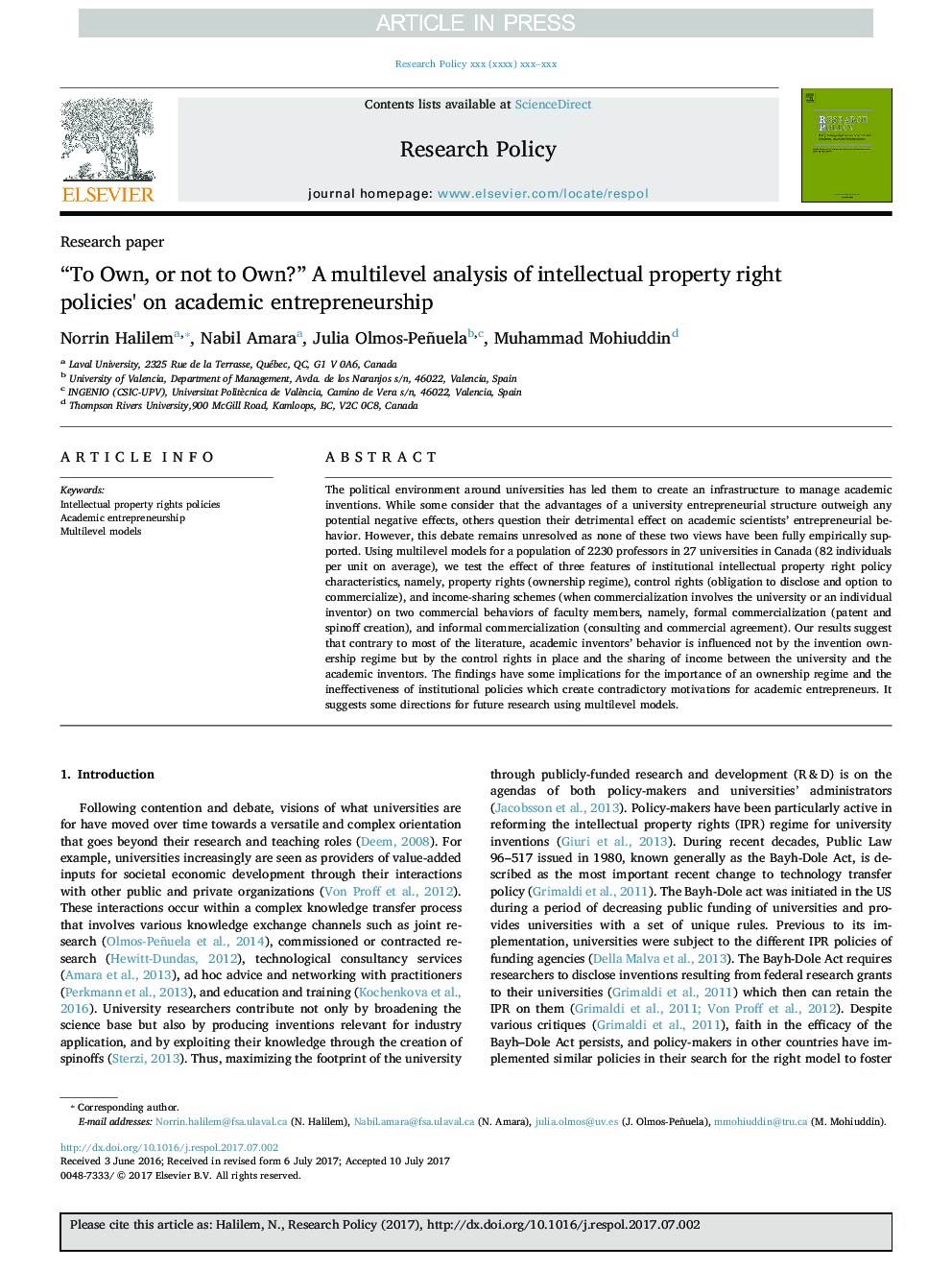| کد مقاله | کد نشریه | سال انتشار | مقاله انگلیسی | نسخه تمام متن |
|---|---|---|---|---|
| 5103908 | 1377408 | 2017 | 11 صفحه PDF | دانلود رایگان |
عنوان انگلیسی مقاله ISI
“To Own, or not to Own?” A multilevel analysis of intellectual property right policies' on academic entrepreneurship
ترجمه فارسی عنوان
یک مالک یا نه؟ تجزیه و تحلیل چند مرحله ای از سیاست های حقوق مالکیت معنوی بر روی کارآفرینی دانشگاهی
دانلود مقاله + سفارش ترجمه
دانلود مقاله ISI انگلیسی
رایگان برای ایرانیان
کلمات کلیدی
حقوق مالکیت معنوی، کارآفرینی علمی، مدلهای چندسطحی،
ترجمه چکیده
محیط سیاسی اطراف دانشگاه ها آنها را به ایجاد یک زیرساخت برای مدیریت اختراعات دانشگاهی منجر شده است. در حالی که بعضی ها معتقدند که مزایای ساختار کارآفرینی دانشگاه بیش از هر اثر منفی بالقوه است، برخی دیگر از تاثیرات مضر آنها بر رفتار کارآفرینانه دانشمندان دانشگاهی است. با این حال، این بحث هنوز حل نشده است، چرا که هیچ یک از این دو دیدگاه به طور کامل تجربی پشتیبانی نشده است. با استفاده از مدل های چند سطحی برای جمعیت 2230 استاد در 27 دانشگاه کانادا (82 نفر در هر واحد به طور متوسط)، ما سه ویژگی ویژگی های قانون مالکیت معنوی نهادی، یعنی حقوق مالکیت (رعایت مالکیت)، حقوق کنترل ( تعهد به افشای و گزینه تجاری سازی) و طرح های به اشتراک گذاری درآمد (زمانی که تجارتی شامل دانشگاه یا مخترع فردی) در دو رفتار تجاری اعضای هیات علمی یعنی تجاری سازی رسمی (ایجاد ثبت اختراع و اسپینوف) و تجاری سازی غیر رسمی (مشاوره و توافق تجاری) نتایج ما نشان می دهد که بر خلاف بسیاری از ادبیات، رفتار مخترعان دانشگاهی نه توسط رژیم مالکیت اختراع بلکه با حقوق کنترل شده در محل و به اشتراک درآمد بین دانشگاه و مخترعان دانشگاهی تأثیر می پذیرد. یافته ها برخی از پیامدها را برای اهمیت یک رژیم مالکیت و ناکارآمدی سیاست های نهادی ایجاد می کنند که انگیزه های متضاد برای کارآفرینان دانشگاهی را ایجاد می کنند. بعضی جهات برای پژوهش های آینده با استفاده از مدل های چند سطحی پیشنهاد می شود.
موضوعات مرتبط
علوم انسانی و اجتماعی
مدیریت، کسب و کار و حسابداری
کسب و کار و مدیریت بین المللی
چکیده انگلیسی
The political environment around universities has led them to create an infrastructure to manage academic inventions. While some consider that the advantages of a university entrepreneurial structure outweigh any potential negative effects, others question their detrimental effect on academic scientists' entrepreneurial behavior. However, this debate remains unresolved as none of these two views have been fully empirically supported. Using multilevel models for a population of 2230 professors in 27 universities in Canada (82 individuals per unit on average), we test the effect of three features of institutional intellectual property right policy characteristics, namely, property rights (ownership regime), control rights (obligation to disclose and option to commercialize), and income-sharing schemes (when commercialization involves the university or an individual inventor) on two commercial behaviors of faculty members, namely, formal commercialization (patent and spinoff creation), and informal commercialization (consulting and commercial agreement). Our results suggest that contrary to most of the literature, academic inventors' behavior is influenced not by the invention ownership regime but by the control rights in place and the sharing of income between the university and the academic inventors. The findings have some implications for the importance of an ownership regime and the ineffectiveness of institutional policies which create contradictory motivations for academic entrepreneurs. It suggests some directions for future research using multilevel models.
ناشر
Database: Elsevier - ScienceDirect (ساینس دایرکت)
Journal: Research Policy - Volume 46, Issue 8, October 2017, Pages 1479-1489
Journal: Research Policy - Volume 46, Issue 8, October 2017, Pages 1479-1489
نویسندگان
Norrin Halilem, Nabil Amara, Julia Olmos-Peñuela, Muhammad Mohiuddin,
